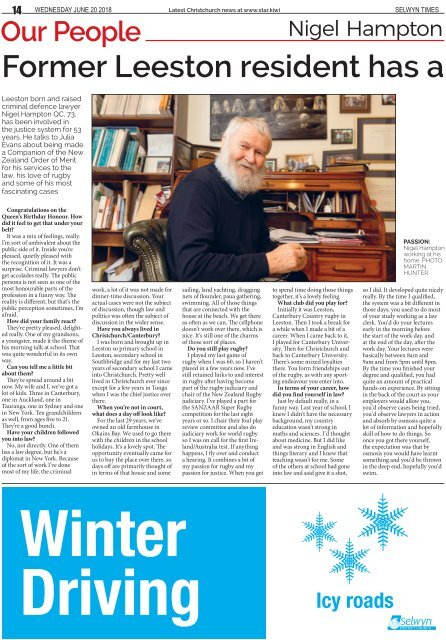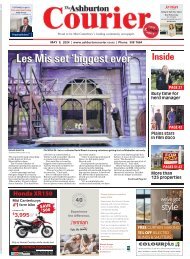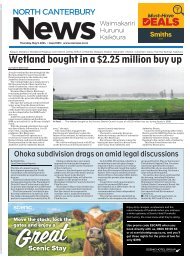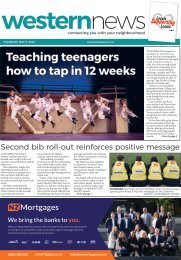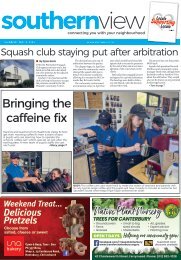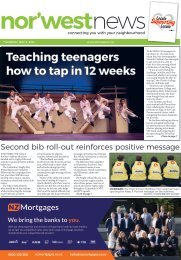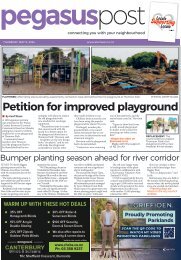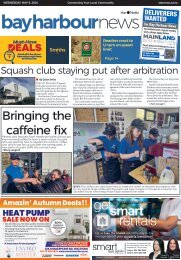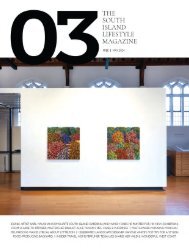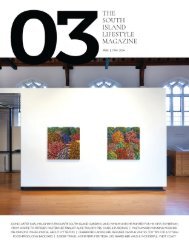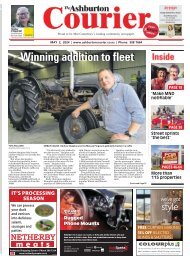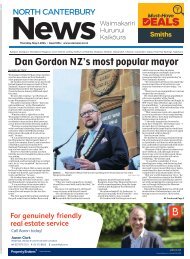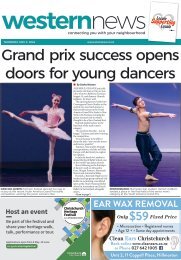Selwyn Times: June 20, 2018
Create successful ePaper yourself
Turn your PDF publications into a flip-book with our unique Google optimized e-Paper software.
14 Wednesday <strong>June</strong> <strong>20</strong> <strong>20</strong>18<br />
Latest Christchurch news at www.star.kiwi<br />
Our People<br />
SELWYN TIMES<br />
Nigel Hampton<br />
Former Leeston resident has a<br />
Leeston born and raised<br />
criminal defence lawyer<br />
Nigel Hampton QC, 73,<br />
has been involved in<br />
the justice system for 53<br />
years. He talks to Julia<br />
Evans about being made<br />
a Companion of the New<br />
Zealand Order of Merit<br />
for his services to the<br />
law, his love of rugby<br />
and some of his most<br />
fascinating cases<br />
Congratulations on the<br />
Queen’s Birthday Honour. How<br />
did it feel to get that under your<br />
belt?<br />
It was a mix of feelings, really.<br />
I’m sort of ambivalent about the<br />
public side of it. Inside you’re<br />
pleased, quietly pleased with<br />
the recognition of it. It was a<br />
surprise. Criminal lawyers don’t<br />
get accolades really. The public<br />
persona is not seen as one of the<br />
most honourable parts of the<br />
profession in a funny way. The<br />
reality is different, but that’s the<br />
public perception sometimes, I’m<br />
afraid.<br />
How did your family react?<br />
They’re pretty pleased, delighted<br />
really. One of my grandsons,<br />
a youngster, made it the theme of<br />
his morning talk at school. That<br />
was quite wonderful in its own<br />
way.<br />
Can you tell me a little bit<br />
about them?<br />
They’re spread around a bit<br />
now. My wife and I, we’ve got a<br />
lot of kids. Three in Canterbury,<br />
one in Auckland, one in<br />
Tauranga, one in Sydney and one<br />
in New York. Ten grandchildren<br />
as well, from ages five to 21.<br />
They’re a good bunch.<br />
Have your children followed<br />
you into law?<br />
No, not directly. One of them<br />
has a law degree, but he’s a<br />
diplomat in New York. Because<br />
of the sort of work I’ve done<br />
most of my life, the criminal<br />
work, a lot of it was not made for<br />
dinner-time discussion. Your<br />
actual cases were not the subject<br />
of discussion, though law and<br />
politics was often the subject of<br />
discussion in the wider sense.<br />
Have you always lived in<br />
Christchurch/Canterbury?<br />
I was born and brought up in<br />
Leeston so primary school in<br />
Leeston, secondary school in<br />
Southbridge and for my last two<br />
years of secondary school I came<br />
into Christchurch. Pretty well<br />
lived in Christchurch ever since<br />
except for a few years in Tonga<br />
when I was the chief justice over<br />
there.<br />
When you’re not in court,<br />
what does a day off look like?<br />
For the last 29 years, we’ve<br />
owned an old farmhouse in<br />
Okains Bay. We used to go there<br />
with the children in the school<br />
holidays. It’s a lovely spot. The<br />
opportunity eventually came for<br />
us to buy the place over there, so<br />
days off are primarily thought of<br />
in terms of that house and some<br />
sailing, land yachting, dragging<br />
nets of flounder, paua gathering,<br />
swimming. All of those things<br />
that are connected with the<br />
house at the beach. We get there<br />
as often as we can. The cellphone<br />
doesn’t work over there, which is<br />
nice. It’s still one of the charms<br />
of those sort of places.<br />
Do you still play rugby?<br />
I played my last game of<br />
rugby when I was 60, so I haven’t<br />
played in a few years now. I’ve<br />
still retained links to and interest<br />
in rugby after having become<br />
part of the rugby judiciary and<br />
chair of the New Zealand Rugby<br />
judiciary. I’ve played a part for<br />
the SANZAAR Super Rugby<br />
competition for the last eight<br />
years or so. I chair their foul play<br />
review committee and also do<br />
judiciary work for world rugby<br />
so I was on call for the first Ireland/Australia<br />
test. If anything<br />
happens, I fly over and conduct<br />
a hearing. It combines a bit of<br />
my passion for rugby and my<br />
passion for justice. When you get<br />
to spend time doing those things<br />
together, it’s a lovely feeling.<br />
What club did you play for?<br />
Initially it was Leeston,<br />
Canterbury Country rugby in<br />
Leeston. Then I took a break for<br />
a while when I made a bit of a<br />
career. When I came back to it,<br />
I played for Canterbury University.<br />
Then for Christchurch and<br />
back to Canterbury University.<br />
There’s some mixed loyalties<br />
there. You form friendships out<br />
of the rugby, as with any sporting<br />
endeavour you enter into.<br />
In terms of your career, how<br />
did you find yourself in law?<br />
Just by default really, in a<br />
funny way. Last year of school, I<br />
knew I didn’t have the necessary<br />
background, my country<br />
education wasn’t strong in<br />
maths and sciences. I’d thought<br />
about medicine. But I did like<br />
and was strong in English and<br />
things literary and I knew that<br />
teaching wasn’t for me. Some<br />
of the others at school had gone<br />
into law and said give it a shot,<br />
PASSION:<br />
Nigel Hampton<br />
working at his<br />
home. PHOTO:<br />
MARTIN<br />
HUNTER<br />
so I did. It developed quite nicely<br />
really. By the time I qualified,<br />
the system was a bit different in<br />
those days, you used to do most<br />
of your study working as a law<br />
clerk. You’d do your lectures<br />
early in the morning before<br />
the start of the work day, and<br />
at the end of the day, after the<br />
work day. Your lectures were<br />
basically between 8am and<br />
9am and from 5pm until 8pm.<br />
By the time you finished your<br />
degree and qualified, you had<br />
quite an amount of practical<br />
hands-on experience. By sitting<br />
in the back of the court as your<br />
employers would allow you,<br />
you’d observe cases being tried,<br />
you’d observe lawyers in action<br />
and absorb by osmosis quite a<br />
lot of information and hopefully<br />
skill of how to do things. So<br />
once you got there yourself,<br />
the expectation was that by<br />
osmosis you would have learnt<br />
something and you’d be thrown<br />
in the deep end, hopefully you’d<br />
swim.<br />
Winter<br />
Driving<br />
Icy roads


